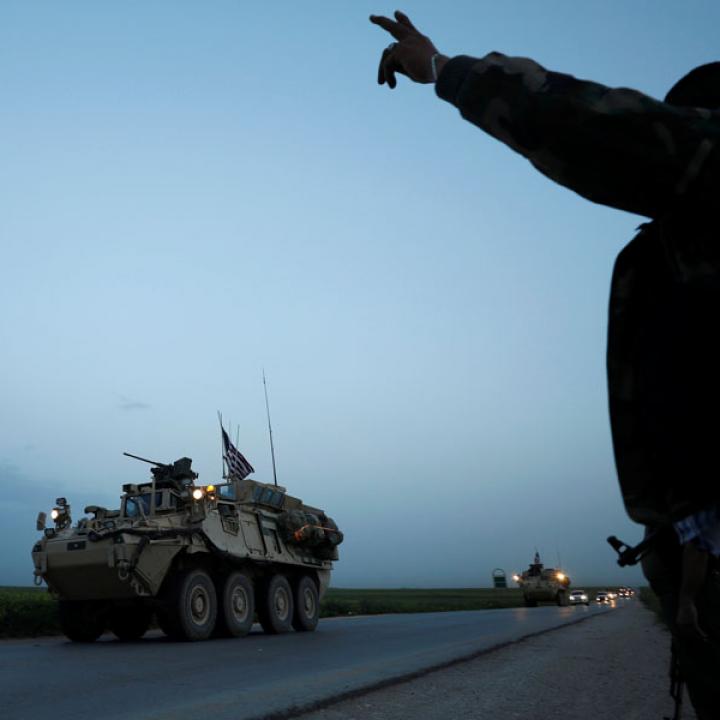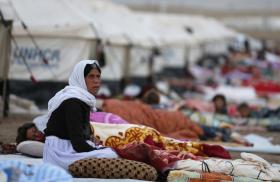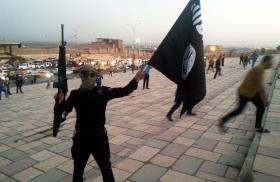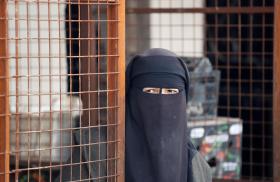
- Policy Analysis
- PolicyWatch 3209
The Islamic State in Syria: What's Next?

Part of a series: Counterterrorism Lecture Series
or see Part 1: U.S. Efforts against Terrorism Financing: A View from the Private Sector
Three leading scholars assess the group’s status and ambitions following the death of its leader, and discuss how to handle the numerous potential supporters still residing in Syrian camps.
On October 31, Aaron Zelin, Devorah Margolin, and Amarnath Amarasingam addressed a Policy Forum at The Washington Institute. Zelin is the Institute’s Richard Borow Fellow and author of the forthcoming book Your Sons Are at Your Service: Tunisia’s Missionaries of Jihad. Margolin is a senior research fellow at George Washington University’s Program on Extremism. Amarasingam is an assistant professor in the School of Religion at Queens University, Ontario, and a senior research fellow at the Institute for Strategic Dialogue. The following is a rapporteur’s summary of their remarks.
AARON ZELIN
On October 31, the Islamic State released a statement confirming the death of leader Abu Bakr al-Baghdadi and announcing that its new “caliph” would be Abu Ibrahim al-Hashemi al-Qurayshi, the presumed nom de guerre of former Baghdadi deputy Haji Abdullah. The coming days will likely see a proliferation of bayat (pledges of allegiance) from IS supporters, since such pledges are leader-specific rather than group-specific and thus need to be renewed with each succession. Also expected are video messages from IS wilayat (provinces) worldwide acknowledging the new caliph.
Past leader Abu Omar al-Baghdadi never appeared publicly, and Abu Bakr al-Baghdadi did not do so until 2014, four years after he became leader, so the next caliph will probably avoid a major public presence. His appointment is also unlikely to spur an ideological confluence with competing jihadist groups such as al-Qaeda.
In operational terms, Baghdadi’s death is unlikely to disrupt the group’s daily activities. Its survival during the U.S. troop surge in Iraq and tribal “awakening” in 2007-2009 is evidence of its ability to adapt. As early as 2016, former spokesperson Abu Muhammad al-Adnani noted that the loss of Mosul, Sirte, and Raqqa would not constitute a true defeat; for IS, territorial defeat is just a test from God. Indeed, IS has claimed more than 600 attacks in Syria since the end of March.
Al-Hawl refugee camp in Syria is a particularly serious concern. Among its 68,000 inhabitants is a separate foreigners’ annex with a section called “Jabal al-Baghuz,” where the most extreme IS adherents function as a hisba force, or morality police. Yet not everyone in the camp is a jihadist sympathizer, and some inhabitants have been victims of IS abuses. One of the facility’s most disconcerting aspects is its weak security architecture and the possibility of breakouts; IS members have already escaped a similar camp in Ain Issa. Just as the 2012-2013 “Break the Wall” campaign in Iraq helped replenish the group’s ranks, mass escapes from Syrian camps and prisons could help IS restart its multigenerational caliphate project.
Thus far, Western nations have abdicated responsibility for their citizens who remain housed in such facilities—an “out of sight, out of mind” policy that is unsustainable and will ultimately come back to haunt them. If the Assad regime gains control of the prisons, it will either execute the Westerners within or use them as bargaining chips. By repatriating these citizens, Western countries will gain greater intelligence and whittle down the group’s potential ranks in theater. At the same time, the United States needs to work on rebuilding trust with the Syrian Defense Forces (SDF), its chief partner in fighting IS before the withdrawal of U.S. forces from the northeast.
DEVORAH MARGOLIN
The context of Baghdadi’s death is important for two reasons. First, he was killed in Idlib, an area known to harbor other terrorist groups on whom he may have been relying for protection or other purposes. Yet any such cooperation would have been on a tactical level, not an ideological level. Second, he killed himself with a suicide vest, and his two wives were wearing similar vests when they were captured. This is notable because suicide is technically prohibited by Islam, except under one fatwa that explicitly applies to women.
When in power, Baghdadi had a potent trifecta of attributes: religious scholarship, familial lineage from the revered Qurayshi tribe, and tactical experience as a military commander. Yet the group’s ideology will endure despite the transition to a new leader, and the fact that Qurayshi was selected by a shura council shows that its bureaucracy is intact as well.
Women will continue to play an important role for IS. The organization initially used propaganda to convince them to join the caliphate as wives, mothers, and educators, offering them the promise of being jihadist torchbearers and members of a sisterhood. The loss of territory led to a shift in this messaging—since then, IS has allowed women to take up arms.
Although some women can be regarded as perpetrators of crimes under IS, all of the children who witnessed and participated in acts of violence under duress should be treated as victims. If the refugee camps fall apart and their inhabitants flee, such children could be taken by IS or be targeted by the Assad regime and other factions who consider them IS members. For this reason, the international community needs to disaggregate women and children into two groups, further identify the radicalized women on a case-by-case basis, and repatriate all foreign fighters.
Indeed, the detainees in Syria pose a humanitarian, moral, and security dilemma. The international community needs to ensure fair trials, rehabilitation, and reintegration for prisoners. It should not allow suspected IS members to be convicted under Iraq’s so-called “ten-minute trials.” Western countries have robust judicial and penal systems and are highly capable of managing this situation. The likelihood of an international tribunal in Iraq is highly doubtful as well, in part because Russia has explicitly objected to the idea.
As for the Islamic State’s operational future, officials should not underestimate the group’s ability to bounce back. They should also consider the possibility that IS affiliates will push back against the central leadership, as al-Qaeda in Iraq (AQI) did against its parent organization years ago.
AMARNATH AMARASINGAM
Al-Hawl camp is unique in its composition. Compared to the more typical camp at al-Roj, which holds 1,700 people and is largely made up of non-radicalized refugees from Mosul, al-Hawl is overcrowded with individuals from more than sixty countries, including many IS adherents. Those residents who were already there when the camp was repurposed in 2016 are considered apostates by the IS members, who have issued threats and committed acts of violence against them. These extremists are also inculcating their children with hatred for the SDF personnel guarding the camp.
Children have been uniquely affected by IS in four main ways. First, they are incurring an educational deficit as a result of parents keeping them home from IS schools in the days of the caliphate. Second, many of them have suffered the loss of a parent and/or sibling. Third, many are traumatized by general exposure to violence, including executions, artillery shelling, drone strikes, and beheadings. Fourth, they are now contending with the refugee experience, including food insecurity, anxiety, depression, survivor’s guilt, loss of culture, dislocation, and the need to learn a new language.
As for the presence of foreigners at al-Hawl, researchers who visited the camp recently were told that American detainees were unavailable for interviews. The United States has supposedly shepherded its citizens out of al-Hawl to smaller camps, though their whereabouts remain unreported. In any case, Washington and its allies should begin preparing for repatriation and reintegration of prisoners, remaining clear-eyed about the difficulty of prosecuting fighters under current statutes. The formation of an international tribunal in Iraq is unlikely because it would need to receive unanimous support in the UN Security Council. Member states would also need to agree on issues such as who would be tried. Given these difficulties, countries should repatriate their citizens under a systematic protocol. It is also critical that U.S. forces continue their raids on IS sleeper cells.
This summary was prepared by Samantha Stern.
The Policy Forum series is made possible through the generosity of the Florence and Robert Kaufman Family.






